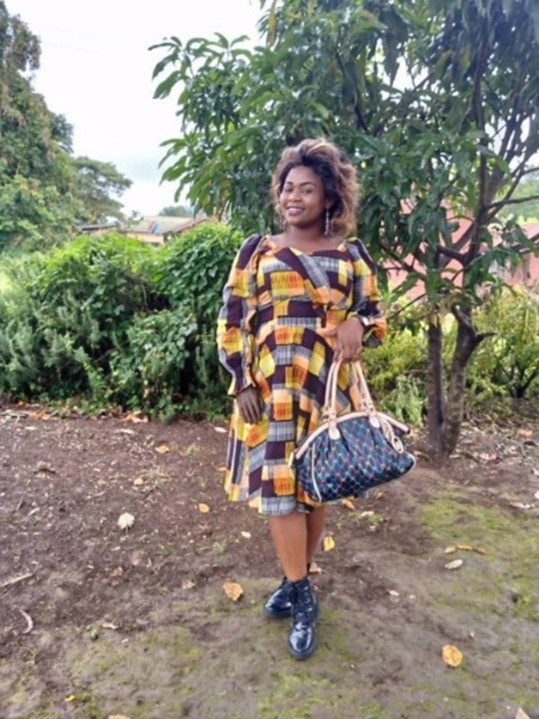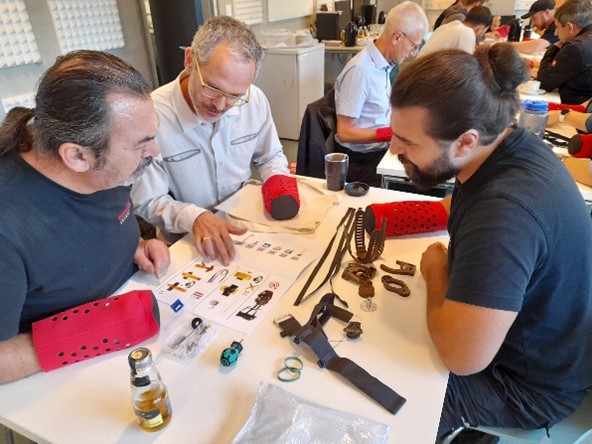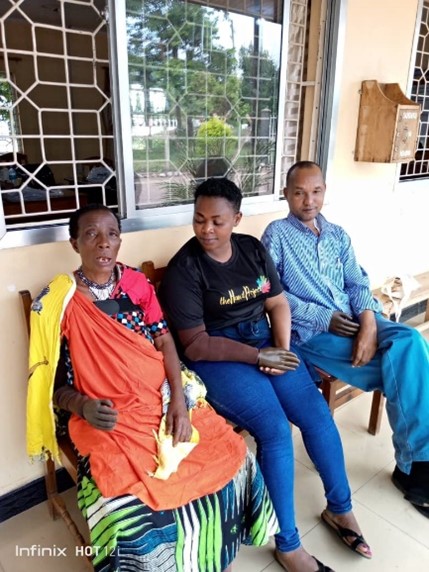By Robin Cowie Nalepa
Associate Director, Communications, Clinical Research
 Veronica Kidemi, The Hand Project Ambassador in Tanzania wearing her cosmetic prosthetic hand she received from The Hand Project. (Photo, courtesy of The Hand Project)
Veronica Kidemi, The Hand Project Ambassador in Tanzania wearing her cosmetic prosthetic hand she received from The Hand Project. (Photo, courtesy of The Hand Project)
Then she learned of The Hand Project. Veronica was initially skeptical that she could be helped given her previous experience with a prosthetic, but a physician friend encouraged her to pursue the opportunity. She traveled many kilometers to a fitting camp held by the organization where she received two new hands, free of charge.
The first was a functional device that could be manually manipulated to hold a utensil, a pen, or other useful objects, but does not look like a true human hand. The second, was a static 3D-printed cosmetic hand.
Though far simpler than electronic prosthetics common in Western countries, both were light weight and designed to fit easily into a socket worn over her residual limb.
“It was a turning point in my life,” she said. “When I got the hand from The Hand Project, I was amazed. This is my dream hand. I put it on all the time.”
 Thermo Fisher Scientific colleagues in Langenselbold, Germany, assemble a prosthetic hand during a team-building exercise in partnership with The Hand Project. Event participants used only their non-dominant hand to better understand the limitations faced by those who would ultimately receive and use the mechanical hand. (Photo courtesy of Lars Friedmann)
Thermo Fisher Scientific colleagues in Langenselbold, Germany, assemble a prosthetic hand during a team-building exercise in partnership with The Hand Project. Event participants used only their non-dominant hand to better understand the limitations faced by those who would ultimately receive and use the mechanical hand. (Photo courtesy of Lars Friedmann)
The signs of success go far beyond joyful tears and heartfelt thank yous. The Hand Project helps recipients live, work, learn and play, restoring dignity along the way.
“For someone to go out in public and actually be able to swing their arms and to walk with pride, that alone gives a whole new sense of dignity,” Chris said. “But it is also in how they go about doing things in their daily lives. For them to be able to once again be able to feed themselves or to write, those sorts of things provide independence and dignity.”
Each year, The Hand Project helps approximately 3,000 people with upper limb amputations. Sadly, the need far exceeds the organization’s capabilities. “There are well over a million people who need hands,” Chris said. “It’s really sad and there are more and more and more all the time.”
The ongoing need for prosthetics requires The Hand Project to rely on corporate sponsors who use team-building events to assemble the German-made components into the prosthetic hands and to fund the breadth of the project.
 Veronica Kidemi (center), The Hand Project Ambassador-Tanzania, sits with a woman and man who received new hands at a fitting event. Each recipient receives two hands, one cosmetic and one mechanical, free of charge. (Photo courtesy of The Hand Project)
Veronica Kidemi (center), The Hand Project Ambassador-Tanzania, sits with a woman and man who received new hands at a fitting event. Each recipient receives two hands, one cosmetic and one mechanical, free of charge. (Photo courtesy of The Hand Project)
“There is a real need,” said Chris, from The Hand Project. “The more hands that we can get the more impact we can make.”
Veronica Kidemi knows that the hand she received through The Hand Project is helping “show the world I can do anything.”
Currently she is pursuing her Master of Education degree, continues to teach literature and English to secondary students, and runs an NGO dedicated to empowering women and girls and advocating for the end of gender-based violence and discrimination.